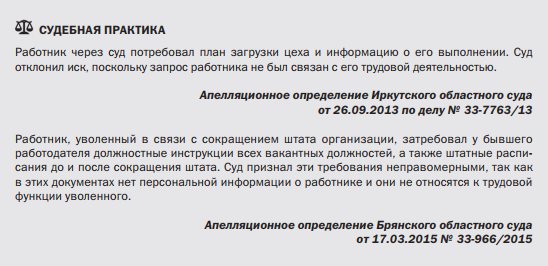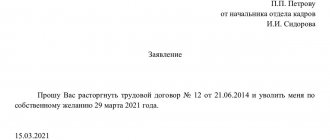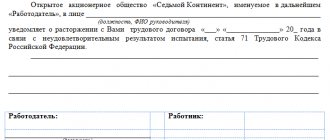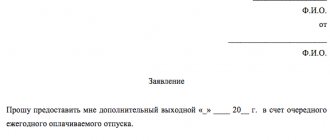What information to request
Article 62 of the Labor Code of the Russian Federation indicates which work-related documents can be requested from the employer:
- work record book for presentation to the Pension Fund for the purpose of obtaining a pension;
- copies of orders on hiring, transfers, dismissal;
- an extract from the work record book or a copy;
- certificates of wages, accrued and actually paid insurance contributions for compulsory pension insurance, and the period of employment in this organization;
- other papers related to the work: characteristics, copies of pay sheets, etc.
What documents can an employee legally request?
The need for a certificate of employment may arise in various cases related to obtaining a loan, cash social benefits, applying for a visa or applying for a pension. In all these situations, you will need certificates of income, length of work experience, and insurance premiums paid.
An employee has the right to receive a work book when necessary in connection with social insurance issues. At the same time, he must return the book within three days from the date of its receipt by the social insurance fund.
Upon dismissal, an employee can apply for a reference letter to be provided at a new place of work. The administration is not legally obligated to issue such a certificate, but has no legal grounds to refuse the employee.
The same applies to documents related to collective labor relations. A request for a copy of the collective labor agreement, extracts from bonus orders is authorized by the employee and must be satisfied after submitting the appropriate application.
Judicial practice proves that the list of duplicate documents that the administration transfers to an employee in response to his written application is not limited by law.
How to write a request
The application is written in free form in the style of business correspondence. Required items in the request:
- information about the organization (name, position and full name of the head);
- information about the employee (full name and position);
- list of requested documents;
- Date of preparation;
- employee signature.
We offer a template for an application for the issuance of documents upon dismissal, which you can use:
| to CEO ________________________ ________________________ From _____________________ ________________________ Statement Based on Art. 62 of the Labor Code of the Russian Federation, I ask you to issue me the following documents related to work:
________________ ___________ Signature Date ____________________________ Registration date ____________________ Job title |
How long does it take to process an application for work-related documents?
The employer cannot ignore the application received by him. Moreover, regardless of the organizational and legal form: whether it is a state body, a budgetary institution, LLC, CJSC, individual entrepreneur, etc.
Documents certified by the seal and signature of an authorized person are provided within 3 working days. Moreover, in the list indicated by the employee. That is why the application must be made in writing. It is advisable to submit it through the secretariat or under the signature of a manager (secretary, assistant, personnel employee).
If the employer violates his duties and does not respond to the employee’s request, depending on the situation, file a complaint with the labor inspectorate or try to negotiate peacefully if you continue to work there. If the statute of limitations for labor disputes is already running out, file a claim. As part of the consideration of the case, file a petition to obtain evidence, attaching a second copy of the application for documents related to work, and the employer will be required to respond to the court request.
How and when to submit an application
In order to register an application to request documents from the employer, you must contact the clerk or personnel officer. The person responsible for office work will register it in the incoming documentation journal and assign a number. Be sure to provide the request in two copies, one of which will remain with the employer, the second - in the hands of the applicant with a registration number. After the three days established by law, you must be given the requested certificates and duly certified copies.
Upon dismissal, the employer is obliged to issue some documents without additional requests. The following are required to be issued upon dismissal:
- STD-R - data on length of service and work activity;
- pay slip (part 1 of article 136 of the Labor Code of the Russian Federation);
- certificate of salary amount f. 182N (clause 3, clause 2, article 4.1 No. 255-FZ);
- RSV - calculation of insurance premiums for the last quarter;
- extract from the SZV-STAZH form;
- extract from the SZV-M form for the last month of work;
- an extract from the DSV-Z in case of transfer of additional insurance contributions to the funded part of the pension for the entire period of work;
- work record book, if it is kept in paper form;
- medical record (if available).
You will need to write an application for the issuance of documents upon dismissal only if additional information is required:
- about income in form 2-NDFL;
- about average earnings for registration at the labor exchange;
- copy of SPV-2 - about the insurance period upon retirement.
ConsultantPlus experts examined the procedure for issuing copies of work-related documents. Use these instructions for free.
WHAT DOCUMENTS DOES NOT AN EMPLOYEE HAVE THE RIGHT TO REQUEST?
Article 62 of the Labor Code of the Russian Federation gives the employee the right to demand not any documents of the organization, but only those that are specifically related to him and his work activity. As an example, in this article we list some types of certificates and orders for personnel. But this list is open; legislators left the opportunity to request other documents. And this uncertainty often leads to conflicts.
For example, some employees request copies of staffing schedules, local regulations, instructions, and protocols. Should they be issued? What criterion is used to determine whether a given document is related to the work of a particular employee? There is no answer in the law, so employers have to decide this on their own, at their own peril and risk.
Local regulations
According to the judges, local regulations do not apply to documents related to the work of a specific employee. The courts confirm that the employer is not obliged to issue copies of local acts with which the employee was properly familiarized during the period of work[3].
Staffing table, job descriptions
The courts believe that within the meaning of Art. 62 of the Labor Code of the Russian Federation, the employer is obliged to provide only those documents that contain the personal data of the employee who made the request[4].
Accordingly, if the document does not contain such data and does not describe the specific job function of the employee, then it is not necessary to issue it at the employee’s request.

Orders for units, regulations of ministries
The employer is also not obliged to issue written orders of the organization concerning structural units as a whole at the request of the employee. Several courts came to this conclusion at once[5].
Also, the employer is not obliged to familiarize employees with the regulatory documents of ministries and departments and provide copies of them. Even if, on the basis of a regulatory act, an employer develops a system of remuneration for employees, a copy of the document can be rightfully refused, because it was not compiled by the company[6].
Forms of primary accounting documents are also not work-related documents[7].
Documents containing confidential information
If an employee does not have access to confidential information, then the issuance of copies of documents containing this information may be refused[8].
The Stavropol Regional Court[9] tried to summarize the legal reasons not to provide employees with copies of documents.
Thus, the basis for refusal to issue a copy may be the presence in the document of information that relates to state, commercial or official secrets, or the presence of confidential information about third parties, including other employees. The court included copies of inventory materials and agreements on full collective liability as such documents.
Vacation schedules and time sheets also contain information about other employees of the organization. Therefore, the employer has the right to refuse to issue copies of these documents to the employee[10].
What to do if the employer ignores the request
Failure by the employer to comply with the three-day deadline for issuing documents entails administrative punishment under Art. 5.27 of the Code of Administrative Offenses of the Russian Federation in the form of a fine in the amount of:
- 30,000–50,000 rubles for the organization, and in case of repeated violation 50,000–70,000 rubles;
- 1000–5000 rubles for an official and individual entrepreneur, again 10,000–20,000 rubles or a ban on conducting activities for a period of 1 to 3 years.
It is recommended to contact the labor inspectorate or prosecutor's office with a complaint. If, in conflict situations, the employer prevents the issuance of supporting copies of orders and certificates, they should be requested in court.
Deadlines for issuing documentation
According to Art. 62 of the Labor Code of the Russian Federation, the organization must issue the requested documents to the employee within 3 working days from the date of application. Copies must be properly certified and issued to the employee free of charge.
In Art. 84.1 of the Labor Code of the Russian Federation talks about the obligation of the manager, when dismissing an employee, to give him copies of documents at his request. The article does not specify a specific period. In any case, the employer does not have the right to prepare and certify copies of documents for more than three days.
If the employee is not given the necessary documents on time, the Labor Inspectorate may impose penalties on both the organization and the head of the enterprise. Fine under Part 1 of Art. 5.27 of the Code of Administrative Offenses of the Russian Federation will be:
- from 30,000 to 50,000 rubles for an organization;
- from 1000 to 5000 for officials and individual entrepreneurs.
If the violation is repeated, the amount of the fine increases.
Let us give an example of how an employer in Khabarovsk was brought to administrative responsibility for late issuance of documents to a resigning employee.
The head of the company was found guilty of violating labor laws, since, contrary to the requirements of Art. 62 of the Labor Code of the Russian Federation, he did not issue copies of documents related to the work of the former employee within the established three-day period. In fact, the documents on the application for dismissal were transferred, but later.
The manager explained the non-compliance with the deadline for issuing the requested copies of documents by the fact that the employees authorized to carry out the relevant actions were temporarily absent. The court did not agree with this. Compliance with labor legislation cannot be made dependent on the presence at the workplace of an employee responsible for carrying out the instructions of the manager.
The head of the organization was sentenced to the minimum sanction under Part 1 of Art. 5.27 Code of Administrative Offenses of the Russian Federation for officials - 1000 rubles.
Types of requests
In the course of production activities, any business entity may need to submit a request to an official structure requesting information or documents. There are many examples of such requests:
- Letter to a commercial partner requesting a price list for services.
- Request from a legal entity to the Federal Tax Service about new standards for reporting.
- A request from a financial institution about the client’s financial condition and business reputation, etc.
Requests are considered correspondence and are subject to standard business practices. Plus, when compiling them, the rules inherent only to this type of document are taken into account. Thus, the request must contain the reason why the correspondent needs to obtain information. Typically this is:
- Legislative acts.
- Court decisions.
- Previously concluded agreements.
The reason can be omitted only if it is obvious to both parties.
The law does not define a single form for a letter of request, therefore a document is drawn up in any form in compliance with a number of rules. It must contain:
- “Header”, which indicates information about the sender and addressee (full name of the structure, legal and actual address, contact information).
- The date and place of its compilation.
- The registration number of the letter under which it is noted in the journal of sent correspondence.
- Title of the document.
- Addressing the addressee. As a rule, addresses by name and patronymic with the prefix “respected” are used. The exception is letters to official government agencies.
- The main essence of the request.
- Signatures of authorized persons and seal of the organization.
The “body” of the document, i.e. It is advisable to start the request itself with justification of the reason. There is no need to describe it in great detail, one phrase is enough. For example, “based on a previously concluded agreement on...” or “in accordance with regulatory act No...”, etc.
The request should state only one specific request or proposal in a concise form. Of course, if the sender has several small requests, it is not worth sending multiple requests to one recipient. If the situation that led to the need to make a request is non-standard, you need to describe it in more detail. So that the addressee has no questions about this.
We invite you to read: How is depreciation of fixed assets calculated?
Any request initially requires an answer. If the sender needs it urgently, this fact must be indicated separately. For example, “a response to this request must be provided within five working days” or “in order to avoid misunderstandings, please respond as soon as possible”, etc.
At the end of the letter, it is advisable to indicate the desired method of response. This could be a request to send:
- Paper registered letter to the designated postal address.
- Email to email.
- Fax message.
- Letter with courier delivery.
There are various classifications of queries. They are divided depending on:
- Purposes of departure.
- Sender type.
- Type of addressee.
Let's look at the most common groups.
This type of request is the most common. In such a letter, the sender asks to provide him with some information, and not documents or parts thereof. This could be information regarding:
- Costs of goods and services.
- Technical characteristics of the offered products.
- Conditions for participation in events, etc.
In such a letter, you should provide as much detail as possible about which product the sender is interested in.
If this is a product, it is necessary to indicate its name, article number, model, brand, production date, etc. Not necessarily, all specified points must be known to the sender, but the available information must be specified as much as possible.
In a letter asking to confirm information, the sender, as a rule, asks to provide him with information and extracts from official documents.
For example, the Embassy makes a request to the applicant’s place of work with a request to confirm the amount of wages for issuing a visa. However, there is no clear indication of the type of document from which information will be provided.
If the applicant requires any documents from the addressee, the request should indicate their name, and not just indicate the essence of the issue. Provided that notarized or other certification of copies is required, this nuance should be specified separately in the text. If the signature of the head of the enterprise and a seal are sufficient, this fact must also be indicated.
Any business entity is obliged to pay taxes to the federal and local budgets. This means that there is constant interaction between the enterprise and the Federal Tax Service. Taking into account multiple changes in tax legislation, subjects periodically need to make clarifications regarding standards or other information. For implementation, a request is made to the Federal Tax Service department. It is formed, as a rule, on behalf of the chief accountant or the head of the structure.
Request to the bank
The need to make a request to the bank may arise from any legal entity, individual, or government agency. It should be borne in mind that the bank will provide only a small amount of information about clients without a court decision. Therefore, requests more often concern information about banking products.
We suggest you read: How alimony is calculated from an entrepreneur on imputation
The response to the request is provided traditionally according to the rules of business etiquette within 2 weeks. If the addressee needs to make separate requests to obtain the necessary information, the period is automatically extended.
For a number of structures, the deadlines for providing responses are determined at the legislative level.








